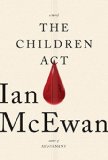Summary | Excerpt | Reading Guide | Reviews | Beyond the Book | Readalikes | Genres & Themes | Author Bio

Self-pity in others embarrassed her, and she wouldn't have it now. She was having a third drink instead. But she poured only a token measure, added much water and returned to her couch. Yes, it had been the kind of conversation of which she should have taken notes. Important to remember, to measure the insult carefully. When she threatened to end the marriage if he went ahead, he had simply repeated himself, told her again how he loved her, always would, that there was no other life but this, that his unmet sexual needs caused him great unhappiness, that there was this one chance and he wanted to take it with her knowledge and, so he hoped, her assent. He was speaking to her in the spirit of openness. He could have done it "behind her back." Her thin, unforgiving back.
"Oh," she murmured. "That's decent of you, Jack."
"Well, actually..." he said, and didn't finish.
She guessed he was about to tell her the affair had already begun and she couldn't bear to hear it. Didn't need to. She saw it. A pretty statistician working on the diminishing probability of a man returning to an embittered wife. She saw a sunlit morning, an unfamiliar bathroom, and Jack, still decently muscled, pulling a half-unbuttoned clean white linen shirt over his head in that impatient way he had, a discarded shirt tossed toward the laundry basket hanging by one arm before sliding to the floor. Perdition. It would happen, with or without her consent.
"The answer's no." She had used a rising tone, like a flinty schoolmarm. She added, "What else would you expect me to say?"
She felt helpless and wanted the conversation to end. There was a judgment to approve before tomorrow for publication in the Family Law Reports. The fates of two Jewish schoolgirls had already been settled in the ruling she had delivered in court, but the prose needed to be smoothed, as did the respect owed to piety in order to be proof against an appeal. Outside, summer rain beat against the windows; distantly, from beyond Gray's Inn Square, tires hissed on drenched asphalt. He would leave her and the world would go on.
His face had been tight as he shrugged and turned to leave the room. At the sight of his retreating back, she felt the same cold fear. She would have called after him but for the dread of being ignored. And what could she say? Hold me, kiss me, have the girl. She had listened to his footsteps down the hall, their bedroom door closing firmly, then silence settling over their flat, silence and the rain that hadn't stopped in a month.
First the facts. Both parties were from the tight folds of the strictly observant Haredi community in north London. The Bernsteins' marriage was arranged by their parents, with no expectation of dissent. Arranged, not forced, both parties, in rare accord, insisted. Thirteen years on, all agreed, mediator, social worker and judge included, that here was a marriage beyond repair. The couple were now separated. Between them they managed with difficulty the care of the two children, Rachel and Nora, who lived with the mother and had extensive contact with the father. Marriage breakdown had started in the early years. After the difficult birth of the second girl, the mother was unable to conceive again, due to radical surgery. The father had set his heart on a large family and thus began the painful unraveling. After a period of depression (prolonged, said the father; brief, said the mother), she studied at the Open University, gained a good qualification and entered on a career in teaching at primary level once the younger had started school. This arrangement did not suit the father or the many relatives. Within the Haredim, whose traditions were unbroken for centuries, women were expected to raise children, the more the better, and look after the home. A university degree and a job were highly unusual. A senior figure of good standing in the community was called as a witness by the father and said as much.
Excerpted from The Children Act by Ian McEwan. Copyright © 2014 by Ian McEwan. Excerpted by permission of Nan A. Talese, a division of Random House LLC. All rights reserved. No part of this excerpt may be reproduced or reprinted without permission in writing from the publisher.




The most successful people are those who are good at plan B
Click Here to find out who said this, as well as discovering other famous literary quotes!
Your guide toexceptional books
BookBrowse seeks out and recommends the best in contemporary fiction and nonfiction—books that not only engage and entertain but also deepen our understanding of ourselves and the world around us.